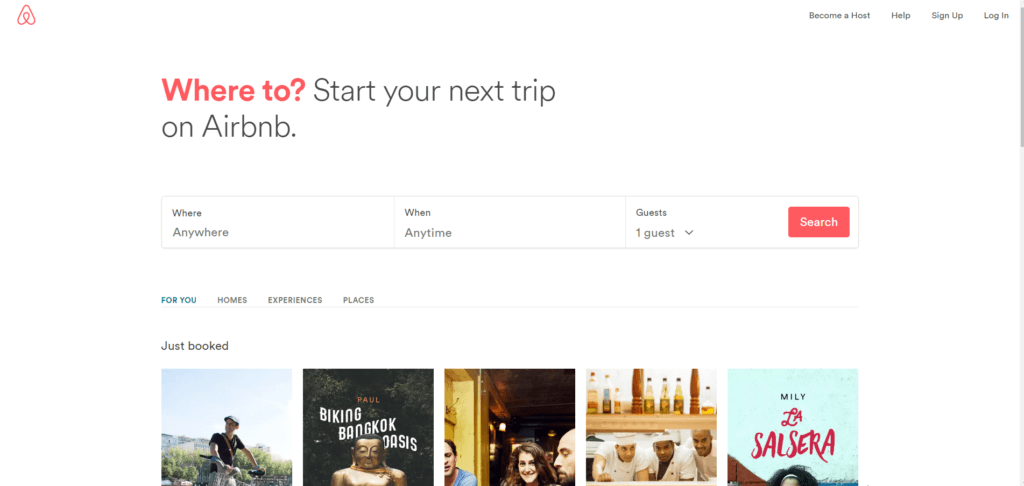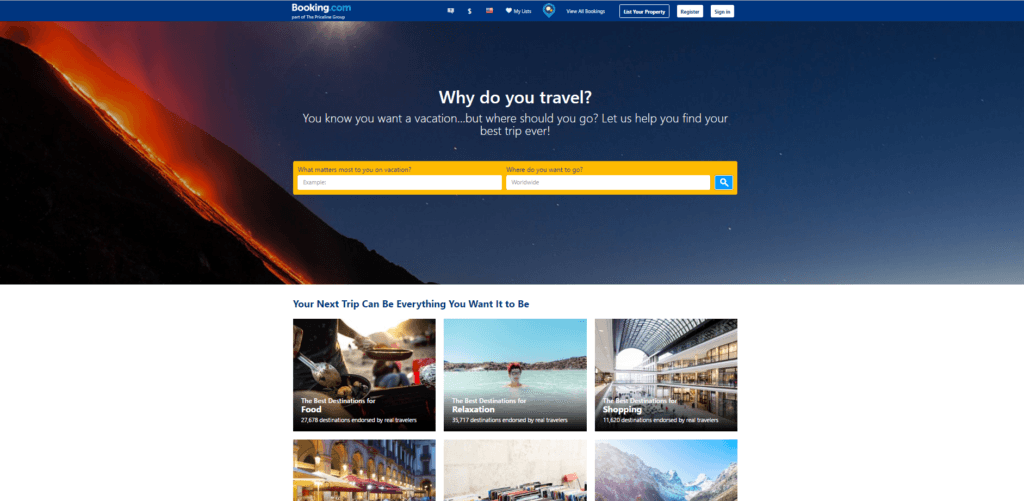The Travel Industry Should Be More “Crowded”

Accommodations platforms can leverage their already existing networks to create useful information and strengthen their communities and offerings.
I think there is an opportunity in the travel (accommodations) industry to utilize crowds to differentiate and enhance platforms. Accommodations platforms such as Airbnb, Homeaway, and Booking.com serve to connect those with housing needs to suitable places. As I reviewed each of these sites to understand all offerings and to think about how they might leverage crowds, I was surprised to find that they each perform other functions dedicated to driving traffic on their sites and subsequent bookings where they can realize value.
For example, Airbnb has an “experiences” and a “places” tab (see image below) where you can book events such as hiking or horseback riding advertised by experience providers or simply see “get together” events taking place for Airbnb community members in certain cities.
Booking.com has a “Destination Inspiration!” (see image below) tab where you can prioritize what’s important for your trip and then see recommended destinations.
However, all of these functions require users to spend time selecting and sorting options. While these offerings may work for most people, I think it may be beneficial for at least some to minimize their search time and maximize targeted results. Crowds could be a solution for this.
One idea would be to allow users (potential travelers) to enter whatever criteria is important to them (as much or as little as they want) as a trip request and have accommodation suppliers respond to these individual requests. The platform could act as an intermediary filtering the best options given the provided information (this would require additional personnel/operations of course) and present these options back to the searcher. The searcher could go with one of these or search via the self-discovery method already in place.
The incentive for searchers to use this feature would be in saved time. To incentivize the suppliers, platforms could reduce the take rate by an appropriate amount (1-4%) for those who respond to individual requests and close a booking. This could particularly be helpful to those suppliers without a proven track record who are new at listing/advertising – provide them an avenue to work a bit harder to gain customers. The benefit to the platform would be a stronger and more trustworthy community that could drive more volume.
Additionally, platforms could use crowds to develop travel recommendations/knowledge to ultimately drive more traffic. When I go to plan a trip, I find myself visiting various sites, platforms, and travel books to find accommodations and plan my itinerary. It would be helpful to have this information available in an integrated way on the same site. For platforms such as Airbnb, Homeaway, and Booking.com, offering a page with itinerary/travel recommendations could be very helpful to its users provided they are quality recommendations. In order to ensure quality, Airbnb could solicit its community (suppliers/customers) to produce travel itineraries and/or recommendations for locations and award the creators of the top products (judged by platform employees) incremental credit for booking on their site (1st place: $200, 2nd place: $100, 3rd place: $50 as an example). The platform could attach the creators’ names to the products so that interested travelers could reach out with specific questions in regards to the itinerary/travel recommendations. Additional awards could be given for itineraries after being used and voted on by travelers. This would provide more quality travel information on the site, potentially increase traffic, and enable more interaction and communication amongst community members.
As the travel and accommodations industry becomes more competitive, using crowds to differentiate products and services and strengthen communities could be key in an industry with relatively low barriers to entry.
Sources:
www.airbnb.com
www.homeaway.com
www.booking.com
http://kigo.net/blog/how-to-increase-vacation-rental-bookings-and-occupancy-through-reviews-and-testimonials.html
Harvard Business School Case: Home Away: Organizing the Vacation Rental Industry
http://www.hbs.edu/faculty/Pages/item.aspx?num=48271





Nice article Tyler. It is interesting how entrepreneurs in the past have thought of websites for curating itinerary, based on a user’s taste, for travel but as a feature it is still absent on these platforms. Considering the there is not a well known site for recommending travel plans and the fact that these travel portals already have so much users, crowd sourcing recommendations in a seamless way should definitely be a focus area for these portals. It not only will make life easier for the travelers but would also increase the community feeling around the portal among the various stakeholders.
I agree, I think it could really enhance some of the offerings.
Tyler – really interesting post and idea.
As the primary trip planner for my group of friends, I hear your pain. I find myself searching Lonely Planet, Trip Advisor, Hostelworld and other sites to plan out itineraries when I am looking to visit a new place. It is very time consuming, but on a positive note, I always feel like I know the city when I arrive and I know what I want to do/see.
I wonder if the solution to your pain is the once considered defunct travel agent. I read recently that Travel Agents are seeing a robust comeback. “In the last year, 22 percent of Americans from households earning more than $50,000 booked travel through a travel agent, an increase from 14 percent just three years ago.” And interestingly enough – a significant portion are millennials who are feeling that same pain – tired of having to take the time to comb through al these websites to curate a personal experience.
Of course the question of using a travel agent is who pays – whether the travel agent takes a cut from the company he/she recommends you tour with or that you pay for the curated assortment. As millennials begin to further recognize the value of their time, I wonder if there will be a shift back towards paying for such services as an aggregated personally curated travel package.
Reference: https://skift.com/2016/06/13/millennials-are-more-likely-to-use-travel-agent-than-any-other-u-s-demographic/
Megan,
This is a really interesting idea – that travel agents could be the answer to this. I could definitely see that happening for non-budget travelers, but for those looking for value, it seems like it would be harder to talk a company (hostel/value hotel) or budget-conscious consumer into paying a travel-agent fee.
You bring up another great point about the benefit of doing your own research even when it’s time consuming – you get to know the place well and will therefore likely have a better travel experience there/appreciate it more. For a consumer looking to do it themselves no matter what, perhaps enabling in the easiest way is the answer.
thanks again for the thoughts!
Thanks for sharing, Tyler – interesting idea! There are a number of new apps that are trying to be “virtual travel agents” that may solve part of the problem you are describing – check out Lola, started by one of Kayak’s founders. I am curious to see how large booking platforms – e.g., TripAdvisor, booking.com, etc – will integrate technology like AI to make the booking and planning process easier, as well as to process the massive amounts of crowdsourced data they already have.
Julia –
Very neat, thank you for sharing about Lola. Just checked it out a bit – seems to be in line with what Megan was writing about above – trend towards travel agents. It will be very interesting to see how technology/AI is used to solve these problems.
Wonderful post! Keep up the good writing. Thanks for sharing with us!